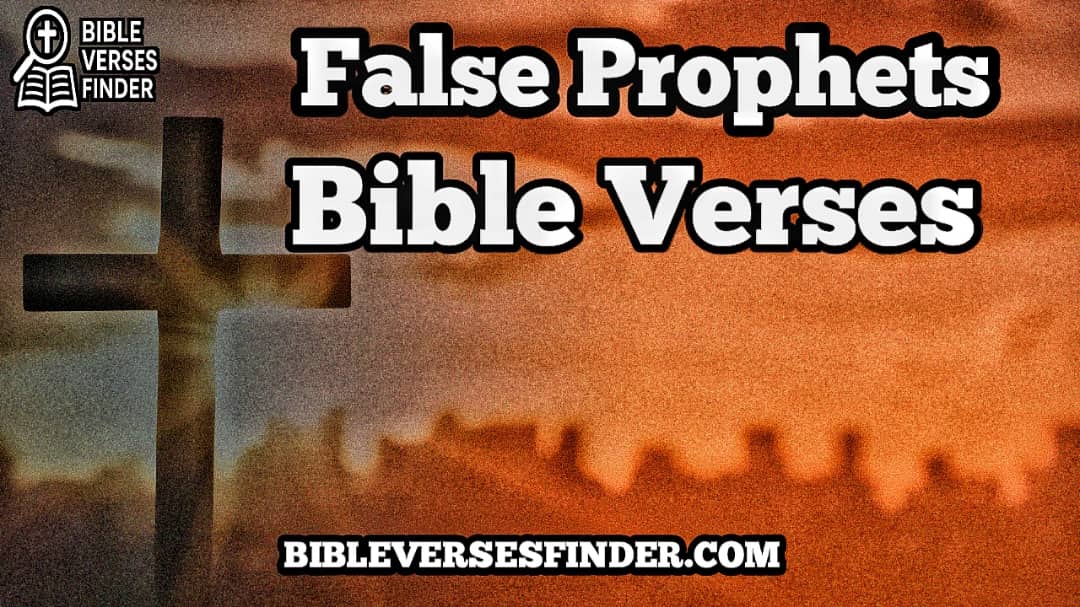It will interest us to let you know that when we talk about false prophets, we’re not just talking about something that happened in ancient times; we’re talking about a danger that still exists today. From the Old Testament to the New Testament, the Bible repeatedly warns us about people who claim to speak for God but actually twist the truth for their own gain. What makes false prophets so dangerous is that they often appear convincing.
They may sound spiritual, quote Scripture, or even perform signs, yet their hearts are far from God. That’s why the Bible urges us to test every spirit, weigh every teaching, and stay grounded in God’s Word. False prophets are not always easy to recognize because they often dress their lies in just enough truth to sound believable.
Also Read: 34+ Bible Verses About Anger That Will Help You

But Scripture doesn’t leave us defenseless. God’s Word gives us clear warnings, wise instruction, and practical ways to guard our faith. Understanding the False Prophets Bible Verse is more than just head knowledge; it’s about protecting our hearts from deception and staying faithful to the voice of the true Shepherd, Jesus Christ.
We will be sharing with you some interesting False Prophets Bible verse that help you dictate one when you see them. Please take your time and read through this article for more understanding. You should not be deceived, and also make sure you are listening to God.
Related: 20+ Best Baptism Bible Verses- Scriptural Backups
What the Bible means by “false prophet”
In the Bible, a “prophet” is primarily someone who speaks God’s message to people. A false prophet, then, claims to speak for God but does not. That can happen in two main ways:
The message is invented when the person speaks something they claim is from God that God never said.
The messenger’s life or fruit contradicts the character and commands of God, even if words sound spiritual.
The Old Testament treats the role of the prophet seriously, and a prophetic word carries weight. So when someone pretended to speak for God but misled the nation, the consequences were severe. The New Testament continues that concern, because false teaching and charismatic deception can destroy faith, lead to moral collapse, and confuse the church.
Key Bible warnings on false Prophets
The Bible’s warnings are repeated and direct. A few of the most important anchor verses you’ll see again and again:
1. The book of Deuteronomy 13 & 18 — God gives guidelines for recognizing a true prophet and warns against anyone who tries to lead people to other gods. If a prophet tells you to follow other gods, don’t listen; and if a prophet speaks presumptuously and the word doesn’t come true, that is a sign.
2. The book of Matthew 7:15 20 — Jesus: “Beware of false prophets, who come to you in sheep’s clothing but inwardly are ravenous wolves.” He tells us to judge them by their fruit.
3. The book of Matthew 24:24 — Jesus warns that false prophets will perform signs and wonders and could deceive many.
4. The book of 1 John 4:1 — “Test the spirits to see whether they are from God.” Testing is a command, not optional.
5. The book of 2 Peter 2; Jude — both warn of false teachers/professors who exploit others and turn truth into license.
Those are guideposts — the Bible doesn’t whisper about this topic. It speaks plainly because the stakes are eternal.
How false prophets often operate (what to watch for)
There’s always variety, but patterns repeat. Here are commonly observed tendencies, explained in plain language:
1. They mix truth with error: A little Scripture or a true spiritual phrase appears, but the main thrust twists the message. Truth is a mask for a false agenda.
2. They promise signs and spectacular outcomes: Extraordinary promises of instant healing, guaranteed wealth, and apocalyptic insider knowledge are a common lure. Jesus warned that signs can be used to mislead (Matthew 24).
3. They exalt themselves or their brand: Prophetic ministry that pivots toward personal glory, money, or control is suspect. Prophets point to God; when they point to themselves, red flags go up.
4. Their moral fruit is poor: Jesus said we know them by their fruit. If a leader’s life is abusive, greedy, sexually unscrupulous, or lacking in humility, those behaviors disqualify a prophetic claim.
5. They discourage accountability: False prophets often resist checks and community oversight. They prefer unchallenged authority.
6. Their teaching undermines Christ or Scripture: A spirit that denies the fundamentals of the person and work of Jesus, repentance from sin, and the authority of Scripture is not from God (1 John 4).
How Scripture tells us to test prophetic claims
Let’s take a look at how the bible tells us to test prophetic claims and how we can also position ourselves to know them more.
1. Does the message align with Scripture? Any prophetic word must conform to the revealed truth of God in the Bible. If it contradicts Scripture, reject it. (This is the bedrock test.)
2. Does the prophecy point to Jesus and God’s kingdom? A true prophetic word will exalt Christ and call people to repentance and faith, not self-serving agendas. (See 1 John 4:2 3.)
3. Does the prophet’s life show godly fruit? Teachings must be matched by character — humility, holiness, and submission to God’s ways. (Matthew 7:16-20.)
4. Does the prophecy ultimately come true (when applicable)? Deuteronomy 18:21-22 provides a concrete test: if someone predicts something in God’s name and it doesn’t happen, that claim is false.
5. Is the spirit behind it edifying and orderly? Paul, in 1 Corinthians 14, insists prophecy in the church should build up, encourage, and be done in order.
NOTE: Test with Scripture, test by fruit, and test by the body of Christ, not by feelings, hype, or a lone charismatic performance.
Visit: 35+ Powerful Bible Verses About Not Giving Up
Why false prophets are dangerous
Why does Scripture hammer this issue? Because false prophecy does real damage:
1. It leads people away from God. A comfortable lie can divert souls from repentance and truth.
2. It fosters spiritual abuse. Authority without accountability can become manipulation or exploitation.
3. It fractures communities. When prophetic claims create factions, churches split, and trust is eroded.
4. It distorts hope. False promises cheapen genuine hope in God and make real faith harder for others.
5. It hides truth under performance. People end up chasing signs instead of hungering for Scripture and Christ.
That’s why Scripture treats false prophecy as a matter of spiritual life-and-death, not mere theological debate.
Practical steps if you receive a prophecy that troubles you
If someone prophesies over you or your church and your spirit says, “Something’s off,” here are practical steps to follow:
1. Just Stay calm. Don’t react emotionally in public. Pause, breathe, and avoid immediate confrontation.
2. Write down what was said. Record details objectively so you can evaluate later.
3. Compare to Scripture. Does the content line up with biblical truth? If not, be skeptical.
4. Wait for fulfillment (when relevant). If the prophecy includes predictions, give time for testing per Deuteronomy 18. Don’t spread alarm or shame before evidence.
5. Consult wise leadership. Bring the word to trusted elders or mature believers for discernment. Community is a safety net.
6. Approach the speaker with humility. If you’re their brother or sister, invite conversation, clarify intent, and allow room for repentance if errors are found (Matthew 18:15-17 is a helpful model for conflict).
7. Protect vulnerable people. If the prophecy could cause emotional or financial harm, involve pastoral care quickly.
8. Pray for clarity and protection. Ask the Spirit to reveal truth and bring peace.
The difference between healthy prophetic ministry and false prophecy
Prophecy and prophetic gifting are biblical and can bless the church. The Bible doesn’t outlaw prophecy it regulates and tests it. Healthy prophetic ministry typically shows these traits:
1. Humility and submission to Scripture and church leadership.
2. Edification, exhortation, and comfort as its goal (1 Corinthians 14:3).
3. Openness to correction and willingness to be accountable.
4. Consistency with the gospel and Christ-centeredness.
5. Evidence of godly fruit in the prophet’s life.
False prophecy flips most of the above: it seeks power or wealth, resists correction, elevates the speaker, and moves people away from the gospel. Distinguishing the two requires prayerful, communal discernment.
Biblical examples to learn from
Be assured that there are some bible examples you can also learn from without stress. Look at them and draw insight into how to follow.
1. Hananiah vs. Jeremiah (Jeremiah 28): Hananiah prophesied peace and a quick end to Babylonian exile, but his word contradicted Jeremiah’s more sobering message and God’s revealed will; Hananiah’s false optimism was exposed.
2. Balaam (Numbers; referenced in 2 Peter/Jude): Balaam appears to give prophetic counsel but is ultimately self-interested and leads Israel into compromise. Peter uses Balaam as a warning of those who corrupt the way of truth.
3. Jesus’ warnings about false prophets: He predicted that false teachers would come with convincing signs; his counsel to “beware” and to check fruit was repeated for a reason.
NOTE: These stories are less about ancient drama and more about timeless patterns we should learn to recognize.
How churches and leaders can protect the flock
Please, there are ways church leaders can help the members of the church. Take a look at some steps below for more understanding.
1. Teach discernment: Regularly equip believers to read Scripture well and test teachings.
2. Create accountability structures: leaders should be answerable to elders, boards, or denominational oversight.
3. Require prophetic testing: have processes for bringing prophetic words before a council for evaluation before public pronouncement.
4. Protect the vulnerable: no prophetic word should be used to pressure someone into giving money, sexual favors, or radical obedience.
5. Discipline and restore: when false prophecy is willful and harmful, leaders must protect people and seek repentance and restoration for the offender.
FAQ About False Prophets in the Bible
I am pretty sure that some questions are running through your mind. Below are some possible questions and answers you will need.
Who is considered a false prophet according to the Bible?
A false prophet is someone who claims to speak for God but does not. Their words either contradict Scripture, fail to come true, or point people away from the worship of the true God. They may look spiritual and even perform signs, but Jesus says they are “wolves in sheep’s clothing” (Matthew 7:15).
Are false prophets only in the Old Testament?
The Old Testament is filled with warnings about false prophets (Jeremiah, Ezekiel, Deuteronomy), but the New Testament also warns repeatedly. Jesus Himself, in Matthew 24:24, says false prophets will rise in the last days. The apostles (Peter, John, and Paul) all addressed the danger of false teachers in the early church.
How can I recognize a false prophet today?
>> Do they contradict God’s Word? (Isaiah 8:20)
>> Do their prophecies come true? (Deuteronomy 18:21–22)
>> Do they point to Jesus or themselves? (1 John 4:1–3)
>> Do they produce good fruit in their lives and ministry? (Matthew 7:16–20)
>> Do they promote greed, pride, or division? (2 Peter 2:1–3)
NOTE: If a person consistently fails these tests, they may be a false prophet.
Can a false prophet perform miracles?
Yes. Jesus warns that false prophets can perform signs and wonders to deceive (Matthew 24:24). Miracles alone do not prove someone is from God. The true measure is whether their message and life align with God’s Word and Spirit.
What are some Bible verses about false prophets?
Some of the most important include:
1. The book of Matthew 7:15 – “Beware of false prophets…”
2. The book of 1 John 4:1 – “Test the spirits to see whether they are from God.”
3. The book of Deuteronomy 18:20 22 – If a prophecy doesn’t come true, the prophet is false.
4. The book of 2 Peter 2:1 Warns of false teachers who secretly bring in destructive heresies.
5. The book of Jeremiah 23:16 – “Do not listen to what the prophets are prophesying to you; they fill you with false hopes.”
Are all false prophets intentionally deceptive?
Not always. Some may be sincerely mistaken or misguided, while others deliberately twist the truth for power, money, or influence. Either way, the effect is dangerous. The Bible treats both as serious, because even well-meaning error can mislead people away from God.
Why are false prophets dangerous?
They mislead people spiritually, often offering comfort or promises that aren’t from God. They can manipulate followers into unhealthy loyalty, financial exploitation, or moral compromise. More importantly, they distort the truth of the gospel, which can harm a believer’s relationship with Christ.
How do false prophets differ from true prophets?
True prophets are humble, Spirit-led, and accountable. Their words line up with Scripture, point people to God, and encourage repentance, faith, and holiness. False prophets often promote themselves, downplay sin, and focus on personal gain or sensational claims. Jesus said you’ll know them by their fruit (Matthew 7:16)
Summary
If there’s one posture the Bible asks of us regarding False Prophets Bible Verse, it’s this: sober vigilance clothed in Gospel love. Be cautious but not paranoid. Test everything; hold fast to what is good. Love those who err and protect those who are vulnerable.
False prophets are a reminder that the Christian life is not about sensational signs but about faithful, steady devotion to Jesus and Scripture. The antidote to deception is not fear, it’s deeper knowledge of God, a heart shaped by prayer and Scripture, and a church committed to truth and grace.





